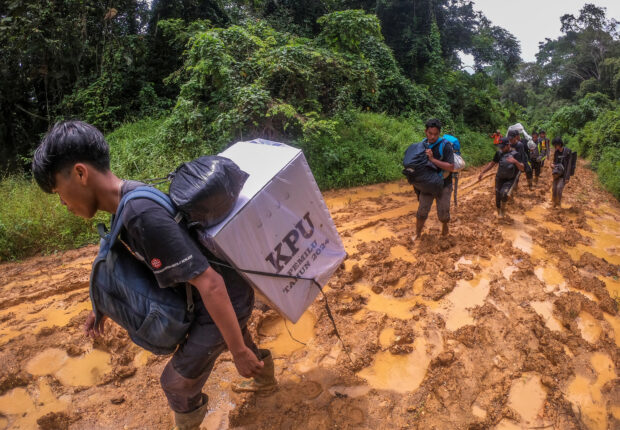Indonesians vote to replace Jokowi, floods disrupt some polling

Election officers distribute ballot boxes to polling stations centre ahead of the presidential election at Alam Bukit Tigapuluh restoration area, in Tebo, Jambi province, Indonesia, February 13, 2024, in this photo taken by Antara Foto. Antara Foto/Wahdi Septiawan/via REUTERS
JAKARTA — Indonesians started voting on Wednesday in areas across the archipelago in an election headlined by the race to succeed popular President Joko Widodo, whose influence could determine who takes the helm of the world’s third-largest democracy.
Nearly 259,000 candidates are contesting 20,600 posts across the archipelago of 17,000 islands in the world’s biggest single-day election, but all eyes are on the presidency and the fate of Widodo’s ambitious agenda after a decade in charge of Southeast Asia’s biggest economy.
The race pits two former governors, Ganjar Pranowo and Anies Baswedan, against controversial frontrunner Prabowo Subianto, a former special forces commander feared in the 1990s as a top lieutenant of Indonesia’s late strongman ruler Suharto.
READ: On eve of Indonesia vote, defense minister ahead despite protests
Defense Minister Prabowo is contesting his third election after twice losing to Widodo, better known as Jokowi, who is tacitly backing and betting on his former rival as a continuity candidate to preserve his legacy, including a role for his son as Prabowo’s running mate.
Article continues after this advertisementJokowi, who cannot run again, has not explicitly backed a candidate, but his implied endorsement is rubbing off on Prabowo, with two surveys last week projecting he will win the majority of votes and avoid a second round.
Article continues after this advertisementThose surveys showed Prabowo with 51.8% and 51.9% support, with Anies and Ganjar 27 and 31 points adrift, respectively. To win outright, a candidate needs over 50% of votes and to secure 20% of the ballot in half of the country’s provinces.
“Jokowi as the decisive factor has been proven by the rising popularity of Prabowo,” said Arya Fernandes of Indonesia’s Center for Strategic and International Studies, noting voter turnout would be crucial to whether he could win in one round.
Voters have a six-hour window to cast ballots. Indonesia has three time zones and polling stations in the east have already opened with voting in western areas due to close by 0600 GMT.
Polling was due to have started in Jakarta, though after big thunderstorms, there were reports of flooding in parts of the capital. At one central Jakarta polling station, the opening was delayed as boxes were delivered and officials were sworn in.
The extent of delays was not clear but Jakarta’s disaster management agency shared photographs of a flooded polling station as officials shifted voting materials to a safer location.
Earlier, the election commission said voting could be delayed in 10 villages in Central Java due to flooding.
Initial indications of the result are expected to emerge later on Wednesday, based on a sample of votes known as “quick counts”. In previous elections, the unofficial counts tabulated by reputable companies have proved to be accurate.
Awkward dance moves
The outcome will be closely watched by investors to see who will take stewardship of a resource-rich Group of 20 economy which under Jokowi has positioned itself as a future destination for multinational firms in the global electric vehicle supply chain.
Undecided voters will be critical to former Jakarta governor Anies and the populist ex-Central Java governor Ganjar to try to force a runoff in June between the top two finishers, a scenario that could shift the dynamic of the presidential race.
READ: How Indonesia holds the world’s biggest single-day election
“I invite everyone to go to the polling stations. Let’s not waste our voting rights because this will decide our future,” Anies said before he was due to vote on Wednesday.
Anies has campaigned on promises of change and preventing a backsliding in the democratic reforms achieved in the 25 years since the end of Suharto’s authoritarian, kleptocratic rule.
Ganjar hails from Jokowi’s ruling party and has campaigned largely on continuing the president’s policies, but crucially is lacking his endorsement.
The 72-year-old Prabowo has cultivated a huge youth following on social media, owing to a rebrand that has transformed his image from a fiery-tempered nationalist and military hard man to a cuddly grandfather figure with awkward dance moves.
Prabowo’s more gentle characterization played out largely on the short video app TikTok, has endeared him to voters under 40, who make up more than half of the 204.8 million electorates.
But Jokowi’s intimated support for Prabowo, plus allegations he interfered in a court ruling to allow his son to contest the vice presidency, have prompted criticism that unlike previous presidents he is not staying neutral over his succession.
His loyalists have rejected that and it is unclear if the allegations will impact Prabowo.